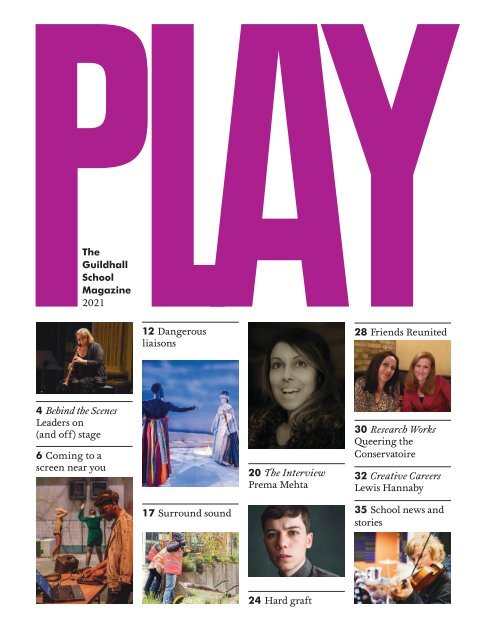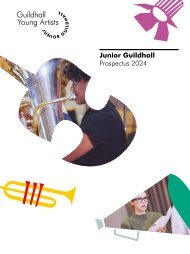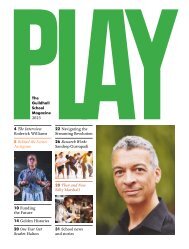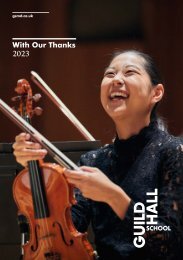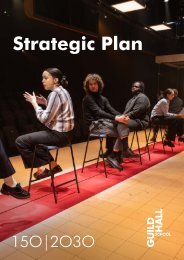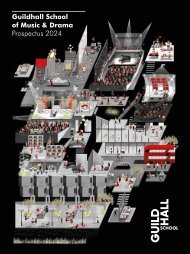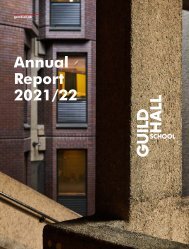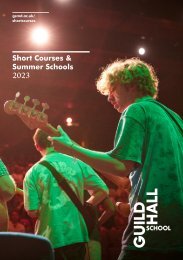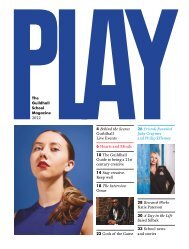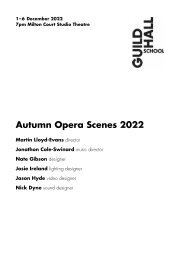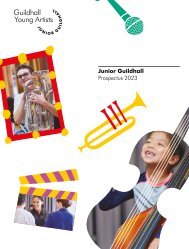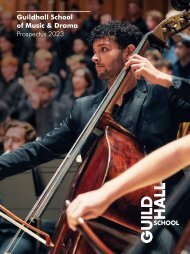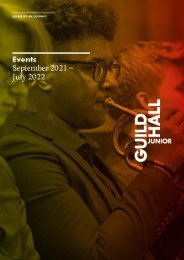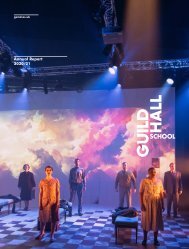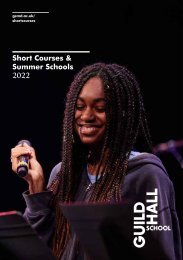Create successful ePaper yourself
Turn your PDF publications into a flip-book with our unique Google optimized e-Paper software.
<strong>PLAY</strong><br />
The<br />
Guildhall<br />
School<br />
<strong>Magazine</strong><br />
<strong>2021</strong><br />
12 Dangerous<br />
liaisons<br />
28 Friends Reunited<br />
4 Behind the Scenes<br />
Leaders on<br />
(and off) stage<br />
6 Coming to a<br />
screen near you<br />
20 The Interview<br />
Prema Mehta<br />
30 Research Works<br />
Queering the<br />
Conservatoire<br />
32 Creative Careers<br />
Lewis Hannaby<br />
17 Surround sound<br />
35 School news and<br />
stories<br />
24 Hard graft
Guildhall Short<br />
Courses<br />
10% off online and<br />
in-person selected<br />
short courses for<br />
Guildhall alumni<br />
Courses are led by experienced Guildhall<br />
School teachers and industry-leading guest<br />
tutors. Ideal for those who are looking<br />
to learn something new or brush up on<br />
existing skills.<br />
To redeem your discount please email<br />
shortcourses@gsmd.ac.uk with the course you<br />
are interested in, as well as the course you<br />
studied and attendance dates. Discounts are<br />
limited and will be allocated on a first come<br />
first served basis.<br />
Find out more and book at gsmd.ac.uk/shortcourses<br />
Editorial Group<br />
Alumni Relations Manager<br />
Charlotte Mathé<br />
Head of Development<br />
Caroline Hawley<br />
Deputy Director of<br />
Advancement<br />
Jo Hutchinson<br />
Deputy Head of Marketing<br />
& Communications<br />
Aurora Lewis-Green<br />
Feature Writing<br />
YBM ybm.co.uk<br />
Design<br />
Jessie Earle<br />
Contact<br />
Email<br />
alumni@gsmd.ac.uk<br />
Twitter<br />
@guildhallschool<br />
Facebook<br />
GuildhallSchoolAlumni<br />
Post<br />
Development & Alumni<br />
Relations Office<br />
Guildhall School<br />
of Music & Drama<br />
Silk Street, Barbican<br />
London EC2Y 8DT<br />
Photo Credits<br />
Toni Nandi, Justin Mamo,<br />
Reb Ricci, Dave Hamblett,<br />
Clive Totman, Paul Cochrane,<br />
Mihaela Bodlovic, Ruth<br />
Crafer, Dave Hamblett,<br />
Maxine Evans, Johan Persson<br />
Illustration (p13)<br />
Eleanor Shakespeare<br />
Welcome to the latest edition of <strong>PLAY</strong><br />
It is my pleasure to welcome you to this edition of <strong>PLAY</strong>, and<br />
introduce myself as the new Interim Principal of Guildhall<br />
School. Although I am new to this role, I am no stranger to<br />
Guildhall School, having been Vice-Principal and Director of<br />
Music for the last 15 years.<br />
In September, we bid a deeply affectionate farewell to our former<br />
Principal, Lynne Williams. Lynne has been an inspiring, gracious<br />
and visionary leader, who has lead us unfalteringly through<br />
one of the most turbulent times in the School’s history. We will<br />
all miss her greatly and we are determined to honour her legacy.<br />
As a new academic year begins at the School, it is a time of<br />
renewal, to inspire each other to new heights, and to push<br />
ourselves beyond the limits. This is a moment for us all to<br />
refocus on excellence in performance, revitalising and refining<br />
our craft, and amplifying our creative spirit.<br />
We continue to address and discuss questions of equality, justice<br />
and respect within our community. This is ongoing and critical<br />
work, and I am grateful to all the alumni, students and staff<br />
who have given their time and thought to these discussions. You<br />
can read more about just one area of this work, which is being<br />
explored by students on our doctoral programme, on page 30.<br />
In this edition we also explore how digital learning at Guildhall<br />
transformed students’ learning during the pandemic, as well as<br />
why the role of the Intimacy Director has become so crucially<br />
important for the industry. We spotlight the valued work being<br />
done by Guildhall musicians in the community, and we interview<br />
alumna Prema Mehta, esteemed lighting designer and founder<br />
of Stage Sight, an organisation which aims to create an off stage<br />
workforce more reflective of our society today.<br />
Please do keep in touch and let us know your news and successes<br />
for the next issue of <strong>PLAY</strong>.<br />
With best wishes,<br />
Jonathan Vaughan<br />
Interim Principal<br />
2 3
BEHIND THE SCENES<br />
LEADERS<br />
ON (and off)<br />
STAGE<br />
Management gurus often<br />
point to orchestras as<br />
prime examples of a highperforming<br />
team. But,<br />
says Jane Booth, Leader<br />
of Guildhall Coaching<br />
Associates, orchestral<br />
players can also benefit<br />
from the knowledge<br />
and understanding that<br />
highly effective teams<br />
from other backgrounds<br />
have acquired.<br />
“Rehearsals are often conducted under<br />
immense time pressure,” she says. “Within<br />
the orchestra, with all the complexities<br />
of the score to work through, players<br />
can leave the rehearsal with personnel<br />
issues left unresolved. On stage, the<br />
orchestra comes together, puts on a great<br />
performance and it all appears seamless.<br />
But a principal player may find themselves<br />
torn between focussing on their own best<br />
performance and supporting others, being<br />
mindful of everyone’s physical and mental<br />
health. That’s where coaching can help.”<br />
“Coaching bridges the gap between an<br />
individual’s current performance and<br />
their ability to be at their very best, to<br />
be in a state of flow. To get there, we<br />
might explore some thorny issues, and<br />
work to unlock the very best version<br />
of themselves.”<br />
Jane, along with Associate Coach Trudy<br />
Wright, recently devised Leaders on<br />
(and Off) Stage, a training programme<br />
in non-musical leadership skills for<br />
principal players. “Within the training we<br />
discuss some of the tensions in orchestra<br />
life. Incredibly, it is often the first time,<br />
after decades of playing in an orchestra,<br />
that they have really discussed leadership<br />
skills of this type.”<br />
people to date, Guildhall Coaching<br />
Associates offer bespoke programmes<br />
for corporate teams, CEOs and other<br />
leaders at charitable organisations,<br />
local government and educational<br />
establishments. Common issues to address<br />
include change management, building<br />
resilience and working through conflict.<br />
Jane, a clarinettist who still performs<br />
internationally, says “A lot of my day<br />
goes on writing tailor-made proposals<br />
for clients, assessing client needs, making<br />
sure I have matched the right people from<br />
our team to the client, and responding<br />
to queries on our training programmes.<br />
I get a lot of questions on ethics!”<br />
She still finds time to coach but she is not<br />
offering a cosy chat. “The language a<br />
client uses can give me great insight into<br />
what they are really feeling. I do a lot of<br />
listening. I try to balance the challenging<br />
moments with some lightness and shade. It<br />
helps if we’re digging deep into ourselves.”<br />
“If I take what I learned<br />
forward, I hope I will<br />
show up stronger on<br />
stage, and wiser off it.”<br />
And it works. As a participant in the<br />
programme admitted recently: “Leaders<br />
on Stage was an eye opener. It helped<br />
structure my thoughts around what<br />
excellent orchestral leadership is. It gave<br />
me a variety of tools to help deal with<br />
sticky situations, from interpersonal<br />
relations to fostering a better overall<br />
working atmosphere. It also showed me<br />
that issues I grapple with are by no means<br />
mine alone. This was the first time I had<br />
ever had the chance to air some of these<br />
with others in similar positions.”<br />
As another participant in Leaders on<br />
(and off) Stage puts it, “If I take what<br />
I learned forward, I hope I will show<br />
up stronger on stage, and wiser off it.”<br />
Find out more about coaching services<br />
at Guildhall at gsmd.ac.uk/coaching<br />
Jane Booth<br />
Many others have been helped in the<br />
nine years the Coaching Programme has<br />
been running at Guildhall. Born out of<br />
a successful professional development<br />
initiative for teachers at the School, and<br />
aimed at improving their mentoring<br />
skills, Guildhall Coaching Associates<br />
is now a professional development<br />
consultancy in its own right. Jane believes<br />
Guildhall is the only conservatoire in<br />
the world to offer such a service.<br />
As well as providing accredited<br />
professional training to more than 500<br />
4 5
“And the winner for the best<br />
performance venue is….<br />
Guildhall School of Music & Drama.”<br />
COMING TO<br />
A SCREEN<br />
NEAR YOU<br />
6 7
Announced at this year’s Mondo*<br />
dr International Awards for<br />
Technology in Entertainment,<br />
Guildhall’s victory over other<br />
established multi-millionpound<br />
venues came after a year<br />
of COVID-19 in which the School safely<br />
put on more than 300 public-facing<br />
productions online. Roughly, in fact, the<br />
same number as students could expect<br />
pre-pandemic. What’s more, many of<br />
these streamed productions attracted far<br />
bigger audiences than could be seated<br />
in the venue itself.<br />
The technical wizardry that made it all<br />
possible was largely down to Jules Hepple,<br />
Head of Audio-Visual and Recording,<br />
who says that the School was quick to<br />
set out priorities. “From the outset, the<br />
Some of the Gold Medal<br />
finalists and jury<br />
aim of the School was to minimise<br />
disruption to the students’ educational<br />
experience. Big bands, orchestras, piano<br />
recitals, string quartets and, of course,<br />
the annual Gold Medal, would all still<br />
go ahead. We were never led by the tech<br />
– we used it to provide the support<br />
needed for education and training.<br />
Students have ended up with the same<br />
performance opportunities, except it<br />
has mostly been to camera instead of<br />
live to an audience.”<br />
To achieve this, Hepple and his team<br />
effectively turned the Guildhall site into<br />
one large TV production company. “Our<br />
facilities had to allow large numbers of<br />
people to create music, put on a play or<br />
simply share education simultaneously<br />
while socially distanced – which often<br />
meant performing in separate rooms.<br />
On day one of lockdown, I found myself<br />
helping a string quartet to practise at<br />
home and I realised the time lag meant<br />
we needed a whole new approach just to<br />
allow them to play in sync.”<br />
“We were able to undertake<br />
an installation programme<br />
that would normally have<br />
taken five years due to<br />
access constraints.”<br />
Hepple also saw an opportunity. “Because<br />
the School was closed to students, all<br />
the rooms were empty. In a couple of<br />
months, we were able to undertake an<br />
installation programme that would<br />
normally have taken five years due to<br />
access constraints.” The solution lay in<br />
a new Network Device Interface (NDI)<br />
together with a Dante Audio Network,<br />
enhanced and customised to enable<br />
collaboration between different spaces<br />
around the school.<br />
“What is unique about our system is<br />
the speed the audio passes around the<br />
space. At less than six-thousandths of<br />
a second, it feels quicker than real time,<br />
as one conductor said to me. The video<br />
transfer time, at under one-tenth of a<br />
second, enables us to sync everything<br />
together seamlessly.”<br />
The system’s first real test came at last<br />
year’s Gold Medal, put back from May<br />
to September, which marked the first<br />
performance by an orchestra in the<br />
UK since lockdown began. “We had 90<br />
musicians in total across four separate<br />
rooms on the campus, with the largest<br />
space used by those on string instruments<br />
and the piano – all socially distanced.<br />
The woodwind and brass sections were<br />
based in separate rooms while the<br />
conductor, Richard Farnes, was located<br />
in a fourth room.”<br />
Soohong Park played his winning<br />
performance of Rachmaninov’s Piano<br />
Concerto No. 2 in C minor in the same<br />
room as the strings and was in direct<br />
communication with Farnes, via a<br />
headset, throughout. Park remembers<br />
it as a very special evening. “I felt we<br />
were connected through the music even<br />
though we were sitting far away from<br />
each other. We all had to listen more<br />
carefully and trust each other when it<br />
came to the performance, and it worked!”<br />
Opera Double Bill<br />
at Guildhall School<br />
This year’s Gold Medal winner, baritone<br />
Tom Mole, is nonetheless grateful that<br />
by the time his chance came around he<br />
was able to perform back on the Barbican<br />
stage, albeit to an audience of just five<br />
in the auditorium – the jury. “Any<br />
performer feeds off their audience, so<br />
of course it is a different experience.<br />
As an opera singer, your reactions can<br />
become smaller, more nuanced when you<br />
are making eye contact with a camera<br />
rather than a person. But, on the day, I<br />
was most worried about whether I would<br />
step off the red cross where I had to<br />
stand for the cameras throughout my<br />
time on stage.”<br />
Mole has since been able to watch his<br />
winning Gold Medal performance,<br />
though it is not an experience he relishes.<br />
“Filming and recording definitely gives<br />
you a greater element of perfectionism<br />
and you have to learn to watch your<br />
own performances without being in<br />
excruciating pain. I don’t think it is<br />
something I will ever get used to, but the<br />
recording has been a great blessing as I<br />
make applications for the next stage of<br />
my career.” Mole made his Glyndebourne<br />
debut this summer.<br />
Guildhall’s Head of Opera, Dominic<br />
Wheeler, believes the challenges set by<br />
the pandemic have been hugely valuable<br />
educationally. “No way has this just<br />
been about artistic survival. The technical<br />
challenge has shone a bright light on how<br />
students self-monitor when they perform,<br />
and sharpened our discussions about how<br />
to listen to self. The students have been<br />
through a high concentration crash<br />
course in adaptability and what it means<br />
to deal with your inner perfectionism.”<br />
Not that it hasn’t been a struggle for all at<br />
times. Mole recalls being “inundated with<br />
technical kit from Guildhall” as he filmed<br />
himself remotely on location for his role<br />
as Aeneas in Purcell’s Dido and Aeneas,<br />
part of last year’s opera double bill which<br />
was put on as a virtual performance. “At<br />
the beginning of the pandemic, I was<br />
definitely gloomy as to how my opera<br />
course would work, as so much depends<br />
on live performance. But Dominic<br />
was so positive that we would get the<br />
opportunities. Drama coaching, language<br />
training, I got them all remotely.”<br />
In fact, right up until the day of release,<br />
Wheeler himself was not sure the<br />
resulting opera would ever be shown<br />
publicly. “Our opera course is all about<br />
a vibrant creative process, and we don’t<br />
focus just on the end result. Now we<br />
were experimenting with the technology<br />
as well as asking new questions of<br />
students, so I wanted to take the pressure<br />
off everyone. But the response was so<br />
positive when we released the 3D virtual<br />
realisation as well as the filmed version of<br />
Dido and Aeneas that we felt emboldened<br />
to make the production available online.<br />
It turned out to be miles beyond anything<br />
else available at that point. No one<br />
had streamed a production with a full<br />
orchestra, let alone an opera.”<br />
In the drama department, too, new<br />
challenges called for new solutions.<br />
They were among the first drama schools<br />
to stream productions live to audiences<br />
around the world, and further adapted to<br />
deliver training in self-led performance<br />
to our final year actors. “This project<br />
is a key moment in their training and<br />
has historically culminated in a sharing<br />
of work to audiences in our rehearsal<br />
room,” says Gilly Roche, Head of<br />
Interdisciplinary Practice.<br />
‘we created a festival<br />
of digital performance<br />
written, directed and<br />
performed by the<br />
students in lockdown<br />
across the world.’<br />
8 9<br />
Gilly Roche
“With the students in lockdown, we<br />
created Pieces of Us – a festival of digital<br />
performance written, directed, performed<br />
and filmed by the students in lockdown<br />
isolation across the world,” continues<br />
Roche. “Filmed on smartphones from an<br />
array of different locations, from city<br />
parks to garden sheds, these 24 pieces<br />
provided a unique and deeply personal<br />
snapshot of the diverse range of stories,<br />
artistry and lived experiences that exist<br />
within Guildhall’s student community.<br />
Pieces of Us was watched by more than<br />
7,000 people around the world – more<br />
than 11 times the number of people who<br />
could have fit into our Concert Hall.”<br />
Preevue CEO Ryan Metcalfe (Technical<br />
Theatre 2017) was worried that his<br />
company’s production of Romeo and Juliet,<br />
streamed online in February <strong>2021</strong>, would<br />
not make it through to the public. “My<br />
co-producer and I were self-funding the<br />
production, with no insurance available,<br />
so if we had to shut down production<br />
due to a case of COVID-19 we were done<br />
for. It’s the first time I have felt like Tom<br />
Cruise, when he was shouting at people on<br />
his film set for not wearing their masks!”<br />
Metcalfe has been working on creating<br />
virtual replicas of theatre venues since<br />
what he describes as “my R&D days” as a<br />
student, when he first set up the company.<br />
“When the pandemic struck, Preevue<br />
could already provide the theatre, the<br />
lighting and the music as a virtual<br />
package. All that was missing was the<br />
Pod, Drama production<br />
at Guildhall School<br />
‘watched by more than<br />
7,000 people around<br />
the world – more than<br />
11 times the number of<br />
people who could have<br />
fit into our Concert Hall.’<br />
actors. And having watched the first<br />
Zoom play readings, I started wondering<br />
how we could produce something<br />
believable with real people dropped in.”<br />
The innovative solution was to film live<br />
actors performing individually in front<br />
of a green screen using a range of<br />
cameras, with their digitally enhanced<br />
performance put into a 2mm accurate<br />
version of the Manchester Palace Theatre.<br />
“We had very strict COVID-19 protocols,<br />
so the entire rehearsal period was just four<br />
days, almost entirely socially distanced.<br />
With one day of COVID-19 testing by a<br />
nurse on-site allowing contact between<br />
actors, Romeo and Juliet had just a day<br />
together to meet, marry and then die.”<br />
With filming finished safely, 482<br />
different visual effect shots made the<br />
Ryan Metcalfe<br />
final edit. The Guardian concluded in<br />
its four-star review that “the digital<br />
enhancements, which leave us questioning<br />
where theatre ends and film begins,<br />
create a marvel of hybridity”. Metcalfe is<br />
“phenomenally proud” of the production<br />
and sees it as the way of the future.<br />
“the hybrid 3D virtual<br />
world of theatre combined<br />
with real live actors<br />
offers the audience at<br />
home something new and<br />
different, and is here<br />
to stay.”<br />
Pod, Drama production<br />
at Guildhall School<br />
“Theatre producers are beginning to see<br />
that the primary audience has changed.<br />
Where once they feared streaming<br />
threatened seat occupation, now they<br />
recognise that streaming can bring in<br />
new, much larger audiences, with greater<br />
revenue potential. I don’t recommend<br />
shooting actors individually for fun – in<br />
many ways it was a horrible experience<br />
– and of course we all missed live theatre.<br />
But the hybrid 3D virtual world of<br />
theatre combined with real live actors<br />
offers the audience at home something<br />
new and different, and is here to stay.”<br />
10 11
DANGEROUS<br />
LIAISONS<br />
Accepting her Leading Actress BAFTA for I May<br />
Destroy You, Michaela Coel (Acting 2012) dedicated<br />
her award to Ita O’Brien, the founder of Intimacy<br />
on Set and a leading exponent of intimacy practice<br />
in theatre, television and film both in the UK and<br />
internationally. “Thank you for your existence in<br />
our industry,” Coel said. “For making the space safe,<br />
for creating physical, emotional and professional<br />
boundaries so that we can make work about<br />
exploitation, loss of respect and about abuse of power<br />
without being exploited or abused in the process.”<br />
12<br />
13
She might have been the first, but Coel is unlikely to<br />
be the last to acknowledge the importance of intimacy<br />
directors and co-ordinators. As the industry reflects<br />
and learns the lessons of the #MeToo and #TimesUp<br />
movements, these practitioners – intimacy directors in<br />
theatres, intimacy co-ordinators in film and TV – are<br />
key to creating a safe space on set and on stage. They work<br />
with actors, directors and producers to choreograph movement<br />
and ensure that everyone truly consents and understands<br />
everyone else’s boundaries. The resulting trust and confidence<br />
gives actors the freedom to create the best work possible.<br />
“Actors, like anyone in any job, should be safe, and there should<br />
be no compromise on that, ever,” says Diane Alison-Mitchell,<br />
Guildhall School’s Head of Movement. “We are all storytellers.<br />
And we can tell the story of the most sexual, sensual moments<br />
just as we would any other part of the story – by being carefully<br />
guided and crafted. From Normal People to I May Destroy You<br />
to Bridgerton, we’ve recently seen the most incredible,<br />
believable sexual scenes. Those actors have spoken publicly in<br />
the media about how much safer they felt, and how they<br />
could just concentrate on their work. It proves that the actor’s<br />
craft thrives because the physical and psychological as well<br />
as emotional care and preparation are securely in place.”<br />
“Actors, like anyone in any job,<br />
should be safe, and there should be<br />
no compromise on that, ever.”<br />
Intimacy directors come from a multitude of backgrounds,<br />
including movement direction, dance and fight direction.<br />
Yarit Dor began her career as a fight and movement director<br />
and is now one of the UK’s leading intimacy directors and<br />
co-ordinators. She has delivered intimacy workshops at<br />
Guildhall every year since 2018. She is the first credited<br />
intimacy director in the West End (for Death of a Salesman in<br />
2019) and is a fully certified intimacy co-ordinator for TV<br />
and film, with credits including Channel 4’s Adult Material,<br />
HBO’s The Nevers and FX Production’s Atlanta. “Because<br />
I work in fight and movement, I facilitate moments that<br />
include extreme emotional states, which very much include<br />
intimacy,” she says. “So, when I heard about intimacy as a<br />
discipline, I was eager to explore it.”<br />
Gone Too Far, Drama production<br />
at Guildhall School<br />
Choreography, says Dor, should never be pre-determined by<br />
the director or the intimacy director in advance and then just<br />
taught to actors – that takes away the actor’s ability to give<br />
informed and continued consent. Instead, it is created through<br />
a collaborative facilitation process, to ensure that it allows the<br />
actor to communicate any feelings of confusion, uncertainty<br />
and fears. The aim is to create a choreography that is as safe<br />
as possible both physically and emotionally. “The minute<br />
something starts to feel uneasy or dangerous we modify it or<br />
remove it entirely, particularly for the stage, where the actors<br />
may be repeating the scene every night for months,” says Dor.<br />
And finally, closure invites the actor to leave the role behind.<br />
“When we touch, kiss or do any kind of intimate positioning,<br />
the nervous system reacts,” says Dor. “Feelings belong to the<br />
actor and so does the body: the character is a mask we wear.<br />
Therefore, stepping out of the character is crucial. IDC teaches<br />
us: ‘The emotions are real but the situation is fake’.”<br />
Dor says that when she’s running workshops in drama schools,<br />
actors have many questions about how they talk about intimacy.<br />
“For example, “What language do I use? How can I avoid<br />
sounding inappropriate? How do I say no to something without<br />
losing a job?’ The moment we equip actors with better<br />
communication tools, then those power dynamics shift.” This<br />
also helps directors, she points out – they, too, may be uncertain<br />
how to talk about what they would like characters to do while<br />
considering their power dynamic in the space.<br />
The intimacy role is much needed but also a wonderful job to<br />
do, says intimacy co-ordinator and director Louise Kempton<br />
(Actor Training - Movement 2018), whose credits include<br />
Peacock’s Brave New World, BBC1’s Chloe and Starz’ Dangerous<br />
Liaisons. She is currently at stage three of a four-part extensive<br />
training programme with Intimacy on Set, and is being<br />
mentored by O’Brien. A project usually starts with highlighting<br />
instances of intimacy in a script. “And it’s incredible how many<br />
people don’t realise what constitutes intimacy. For example,<br />
there’s a shot of someone in the shower – how are you going<br />
to shoot that?”<br />
Much of the work takes place well before she goes on set; she<br />
will discuss the scenes with the director and individually<br />
check in with actors to discuss their boundaries and preferences.<br />
Once on set, Kempton helps to create the scene, thinking about<br />
how it reflects the character and drives the story forward but<br />
also considering the practical elements – for example, is it<br />
repeatable? “I have had actors across genders and all levels of<br />
experience tell me that they are really glad we are here and part<br />
of the process,” she says. “It’s nice to have someone who can<br />
reassure them when they are anxious and feeling vulnerable.”<br />
Intimacy is becoming an accepted industry standard – and<br />
a vital part of training, too. In August 2020, Dor helped to<br />
establish the Broadcasting, Entertainment, Communications<br />
Barbarians, Drama production<br />
at Guildhall School<br />
and Theatre Union (Bectu)’s Intimacy Coordinator Branch,<br />
which she currently chairs. She contributed to Director’s<br />
UK guidance, as well as co-writing guidance supported by<br />
Equity, giving a comprehensive intimacy practice document<br />
for live performance and film and TV. The intimacy directors<br />
and co-ordinators network she co-founded with Lizzy Talbot,<br />
Intimacy for Stage and Screen, has worked with Equity to<br />
create a comprehensive intimacy practice document for live<br />
performance and film and TV. And at Guildhall, intimacy<br />
will become embedded into the new BA Acting curriculum<br />
that began in September. It will be approached just like any<br />
other core aspect of the actor movement training, says Diane<br />
Alison-Mitchell, and will be applied practically through all<br />
productions and projects.<br />
“It’s a critical time, as the shifts being<br />
made in this area are long overdue.”<br />
“We want to have a really close relationship with how the<br />
industry is moving and changing in this area,” she says. “It’s<br />
a critical time, as the shifts being made in this area are long<br />
overdue. Actors are skilled artists who understand themselves<br />
within the profession and in the world, and the training needs<br />
to support that. We are part of that change.”<br />
She trained in intimacy direction with IDC (Intimacy Directors<br />
& Coordinators) in the US. There, she was taught by Tonia<br />
Sina, who researched and taught intimacy choreography for<br />
stage since 2004, and Alicia Rodis, who originated the role<br />
of the intimacy coordinator on set. IDC created The Pillars of<br />
Intimacy – context, consent, communication, choreography<br />
and closure.<br />
What does that mean in practice? Context looks at the intimacy<br />
in the script and the dramaturgy of it throughout the play.<br />
That way, directors and actors start from a place of full<br />
transparency and clarity. Consent is throughout: especially<br />
once they agree on the vision, actors can give informed<br />
consent. Communication is a huge keystone, particularly in<br />
a space where power dynamics are very much in play.<br />
One student on Dor’s workshop found this aspect of the<br />
experience particularly enlightening. “She told us that we<br />
have a lot more power than we might think,” she said. “I can<br />
say that I’m happy with, for example, people seeing my<br />
stomach or my thighs but not my bum. I can negotiate how<br />
many people are in the room, or the modesty protection that<br />
I wear. I know that if someone tries to get me to do something<br />
that isn’t in my contract, I can ask for filming to be stopped<br />
so we can talk about that. And, of course, I can ask for an<br />
intimacy co-ordinator to be present.” Another workshop<br />
attendee found the experience a revelation. “Once you know<br />
the boundaries, you have so much freedom,” he said. “You can<br />
just focus on being present, instead of worrying that you’re<br />
going too far. And that’s when the scene comes alive – it<br />
ignites and it’s incredible.”<br />
14<br />
15
S U R R<br />
O U N D<br />
A new mother lies exhausted on her hospital bed in the<br />
postnatal ward, alone except for the baby asleep next<br />
to her. The lullaby playing through her headphones<br />
transports her back to her own childhood. An NHS worker<br />
pauses, exhausted, in a community garden, closing his<br />
eyes and listening to the sounds of the grass in the wind.<br />
A man living with dementia in a small flat, in lockdown,<br />
taps his fingers along to the Spanish guitar melodies he’s<br />
loved all his life. And a young musician in a church hall<br />
discovers, for the first time, the joys of improvisation.<br />
The use of music in their disparate worlds has brought<br />
something to all their lives. It could be happiness, escape,<br />
self-expression or remembrance. But it’s always powerful.<br />
Helena Ricci<br />
16<br />
SOUND17
“To me, creating music in the<br />
community, where many different<br />
points of view exist, is a political act,”<br />
says Rhia Parker (Leadership, 2015), a<br />
recorder player, composer workshop<br />
leader and tutor for the Barbican’s<br />
Creative Learning department. “It is<br />
no accident that totalitarian regimes<br />
clamp down on artistic expression.<br />
It’s an incredibly important thing.”<br />
The past year has seen so many people<br />
apart and isolated: venues locked and<br />
streets empty. But community music<br />
practitioners have shown extraordinary<br />
ingenuity in finding new ways to reach<br />
them – moving from church halls<br />
to Zoom calls. Parker is the leader of<br />
the Music, Memory and Me project,<br />
a collaboration between Guildhall,<br />
University College London Hospital<br />
(UCLH) and the Royal Free Hospital<br />
that enables musicians to play live to<br />
elderly people on dementia wards. When<br />
the pandemic hit, and they could no<br />
longer take their music to the wards,<br />
UCLH suggested creating a new project<br />
to engage with women in the antenatal<br />
and postnatal wards.<br />
Parker and her team carried out extensive<br />
research around the experiences of<br />
women giving birth during the pandemic.<br />
“Many had had traumatic experiences:<br />
perhaps their partners hadn’t been<br />
allowed to be present for the birth, or<br />
they had been left alone and feeling<br />
isolated immediately after giving birth<br />
or in the days following,” says Parker.<br />
“We wanted to offer something to these<br />
women which they could access in<br />
whatever way they felt was useful during<br />
this incredibly difficult time.”<br />
Initially, it was hoped that this could be<br />
a face-to-face project, but as the enormity<br />
of the pandemic sank in, Parker and her<br />
team of postgraduate students had to<br />
find a way to deliver it remotely. They<br />
created Music for Relaxing, Bonding and<br />
Healing: six pieces of music including<br />
lullabies, folk songs and a field recording<br />
Rhia Parker<br />
of nature sounds. To make the music<br />
accessible to everyone, no matter what<br />
language they spoke, each piece was<br />
assigned a colour: blue for rocking,<br />
swaying and calm, green for nourishing<br />
and growing, yellow for warmth, light<br />
and glow. They then created a website<br />
that women could access via a QR code<br />
on a poster on the ward wall.<br />
Running a community project remotely,<br />
with no direct contact with the groups<br />
you hope to serve, has been a huge<br />
challenge. “As a practitioner, you never<br />
want to helicopter in. You want to follow<br />
through and get feedback,” Parker points<br />
out. “But if just a few people found joy<br />
in those moments, that’s great. And most<br />
of the time, when we are performing,<br />
it’s a transient experience. But this<br />
website is still there, and it can stay<br />
there.” Projects like these are, she says,<br />
part of the care ecosystem, playing a<br />
valuable and impactful role in the lives<br />
of not just the patients but also the<br />
musicians. “It’s not like music comes in<br />
and solves all the problems. We might<br />
help connect some dots. Or provide a<br />
moment of respite, enabling someone<br />
to take their medication.”<br />
Creating space for those moments is key<br />
for Tara Franks (Leadership, 2009), the<br />
founder, director and creative leader of<br />
SoundsCreative Projects, a Hackney-based<br />
social enterprise which Franks hopes to<br />
take with her to her new home in<br />
Hastings. A classically trained cellist and<br />
trained primary school teacher, she is<br />
now a workshop leader and collaborator.<br />
SoundsCreative Projects brings those<br />
two parts of her life together. Tots Tunes,<br />
which she started 10 years ago, is an<br />
interactive parent-and-baby music<br />
session aimed just as much at the adults<br />
as the children; Vox Voices is a joyful,<br />
supportive group for women who want<br />
to find or rediscover their voices; and<br />
the SoundsCreative Ensemble brings<br />
young musicians together.<br />
“I’m a huge advocate for the physical<br />
and mental benefits of singing and<br />
movement as well as playing,” says Franks.<br />
“But friendships also develop. Perceptions<br />
can change. A woman who came to one<br />
of my workshops said she had no idea<br />
how she could use her voice. It has given<br />
her a different sense of herself.”<br />
‘Much of the work I do facilitates<br />
the self-expression of someone<br />
who may have little control over<br />
their own life.’<br />
project inspired by an object. Objects as<br />
Memorials was a series of workshops<br />
centred around the restored organ in<br />
the North London church of St Mellitus,<br />
which commemorates lives lost and<br />
saved in the First World War. It focused<br />
on objects that represent us – our stories<br />
and our past and future journeys. The<br />
players recorded their contributions as<br />
voice memos which were put together<br />
to form a whole. “Everything I do is<br />
about gathering people and connecting<br />
people through music,” Franks says. “It<br />
could be any kind of music, anywhere.<br />
It’s experiential; it’s about being part of<br />
the sound, feeling it, and using it to<br />
express yourself.”<br />
Taking music out to the community<br />
doesn’t just benefit those who hear it,<br />
but also the practitioners themselves.<br />
During the pandemic, harpist Helena<br />
Ricci (Harp 2019) wanted to use her skills<br />
to help. She volunteered for the Music<br />
Bank project, which saw Guildhall<br />
partner with Age UK Camden to bring<br />
music to isolated people living with<br />
dementia during the winter months.<br />
She regularly played over Zoom for an<br />
audience of one: a man with dementia<br />
who loved jazz, Spanish music and<br />
acoustic guitar music.<br />
Em Davis (Production Arts, 2020) recently<br />
created the promo film for the Moor<br />
Lane Community Garden, a temporary<br />
installation aiming to increase green<br />
space in that part of East London, along<br />
with current student Charlie Vince-<br />
Crowhurst and Sam Storey (Electronic<br />
Music, 2023) who created the music.<br />
The video brings a portrait of you in a<br />
garden, now, a poem by Kit Finnie, to<br />
life, with images and sound inspired<br />
by the garden itself. “It is so important<br />
that we keep creating for each other,<br />
even when we are not together,” says<br />
Davis. “To celebrate something like a<br />
community garden, a place of such<br />
tranquillity and beauty, was an incredible<br />
privilege, as was working with all the<br />
community members who made the<br />
project happen.”<br />
Tara Franks: Vox Voices<br />
Moor Lane Community Garden<br />
Tara Franks: Tots Tunes<br />
This year, she brought together crossgenerational<br />
groups and young string<br />
players together in a virtual space for a<br />
“He was a true music lover, so connected<br />
to the music,” says Ricci. “But we also<br />
talked: it felt more like a conversation.<br />
He looked forward to the Zoom calls<br />
very much, so I know it helped his<br />
wellbeing. But it helped mine, too – I<br />
looked forward to them as well. Live<br />
music wasn’t possible during lockdown<br />
and doing this helped me feel that my<br />
work as a musician was valued. It was<br />
such a rewarding experience.”<br />
As the world starts to open up,<br />
practitioners in the community are once<br />
again excited about the possibilities of<br />
creating a space where those moments<br />
can happen – whatever they might be.<br />
“Much of the work I do facilitates the<br />
self-expression of someone who may have<br />
little control over their own life, such as<br />
a rough sleeper or a dementia patient,”<br />
says Parker. “But in that moment, they<br />
can choose what song they want to hear.”<br />
18 19
THE INTERVIEW<br />
It’s the last few frantic days before the production<br />
of A <strong>Winter</strong>’s Tale and 18-year-old Prema Mehta<br />
is finalising her lighting plan: in particular, the<br />
key moment when Hermione changes from statue<br />
to real person. Notebook in hand, she rattles off<br />
her instructions to her tutor, who was balanced<br />
precariously on a stepladder. Mehta doesn’t know<br />
it yet, but in 20 years’ time she will find herself<br />
doing the same thing, for the same production.<br />
Except this time, it won’t be for Theatre Studies<br />
A-level at Woodhouse College, North Finchley – but<br />
as lighting designer for Erica Whyman’s acclaimed<br />
production at the Royal Shakespeare Company.<br />
CAMERA, ACTION<br />
20
“I remember that first production so<br />
clearly, particularly my tutor David<br />
Kinder, who was a real inspiration to me,<br />
and was up that stepladder, focusing the<br />
lights as per my instructions,” Mehta<br />
says. “To picture that snapshot and then<br />
realise I’ve made it to the RSC – that’s<br />
a very special journey.”<br />
Mehta first encountered the theatre as a teenager, during a<br />
school trip to a West End production of Willy Russell’s Blood<br />
Brothers. “I’m British Asian, and my immediate family didn’t<br />
go to the theatre, so I was something of a late starter,” she says.<br />
“I remember the emotional impact of that performance, but I<br />
also left knowing that there was some sort of magic happening<br />
that I couldn’t pin down. As I got older, I broke it down and<br />
it was all about scene changes, choreography, costumes – all<br />
that coming together.”<br />
She knew that she wanted to get involved in this world<br />
somehow, but acting never appealed: “I was the kid at the back<br />
during improvisation class thinking, ‘Please don’t pick me!’”<br />
Taking GCSE Drama – which was then compulsory – and<br />
then an A-level in Theatre Studies opened her eyes to all the<br />
different careers available behind the scenes. “Had I not been<br />
introduced to theatre by the education system, I wouldn’t have<br />
chosen a career in theatre: it’s as simple as that,” she says. “Mr<br />
Kinder said to me, ‘Why don’t you consider drama school?’<br />
And I said, ‘What’s drama school?’ That’s when I first heard<br />
about Guildhall.”<br />
Mehta arrived at Guildhall for her BA (Hons) in Stage<br />
Management and Technical Theatre eager to learn about<br />
“everything I didn’t know”. She didn’t decide on a career in<br />
lighting design until her second year, having narrowed down<br />
her options to either set design or lighting design. Placements<br />
with two practitioners at the top of their game, stage designer<br />
Es Devlin and lighting designing Neil Austin, helped her<br />
decide. “Neil said to me that the purpose of spending time with<br />
him was to put me off being a lighting designer – the low fees,<br />
the intense hours, the back-to-back contracts,” she remembers.<br />
“I’m sure he did his best, but he didn’t know me very well!<br />
That one sentence made me even more determined to go out<br />
there and be a lighting designer.”<br />
Of course, it wasn’t that easy. After she left Guildhall, Mehta<br />
started again, right at the bottom: small venues, profit-sharing,<br />
working other jobs to get by. There were other, unexpected<br />
challenges, too. “The job demands that you’re independent,<br />
that you finish late, that you travel extensively,” she points out.<br />
“I didn’t come from a family where we finished work at 10pm<br />
and were comfortable walking home, or who travelled here,<br />
there and everywhere on the train. Most people think these<br />
things are easy, but they weren’t to me.”<br />
It took her eight years, she says, before she felt comfortable<br />
enough to focus entirely on her lighting career, during which<br />
she had to focus not just on her craft but also on relationshipbuilding<br />
and her confidence. There wasn’t a single day that<br />
she didn’t consider giving up. “The brilliance – and the fear<br />
– of theatre is that you are working with different people all<br />
the time. How are you going to collaborate with new team<br />
members? How are you going to lead a group of technicians<br />
– who are largely men? But you must go through that process:<br />
find your confidence, build your skillset, and style and trust<br />
your instincts. You can’t be taught what you learn on these<br />
journeys. You have to experience them yourself.”<br />
To say that her work paid off is something of an understatement.<br />
“Prema Mehta’s lighting stains the setting with the blush of<br />
dawn, the fire of sunset and the glow of the moon,” wrote<br />
The Times’ Sam Marlowe in his review of Sebastian Armesto<br />
and Simon Dormandy’s A Passage to India. Mehta now has<br />
16 years’ experience under her belt and has lit more than 200<br />
productions across the UK, including Simon Evans’ A Day<br />
in the Death of Joe Egg at Trafalgar Studios, Nick Winston’s<br />
Fame at the Peacock Theatre, and Natalie Abrahami’s Swive<br />
(Elizabeth) at the Globe.<br />
Her lighting design is permanently installed in Madame<br />
Tussaud’s A-List Area and, in 2019, she was nominated for<br />
the h100 Awards, recognising the UK’s most innovative and<br />
diverse talent. Most recently, Mehta lit Blanche McIntyre’s<br />
Hymn at the Almeida, which was live-streamed in February,<br />
and shown on Sky Arts, as well as opening to a live audience<br />
this summer. “That was quite a journey, as lighting for camera<br />
is very different from lighting for the stage,” says Mehta.<br />
“You just have to learn! It helped that Blanche has a fantastic<br />
way of working. She gives you so much space as a creative<br />
collaborator: no idea is too daring to discuss.”<br />
And Mehta’s years spent backstage in venues around the UK<br />
– observing who makes up the backstage workforce and<br />
having frank conversations with artistic directors about<br />
diversity – led directly to her founding Stage Sight in March<br />
2019. It’s a collaborative network that aims to help create an<br />
off-stage workforce which is truly reflective of society and<br />
inclusive of ethnicity, class and disability.<br />
“So many people I talked to acknowledged the lack of diversity<br />
but didn’t know how to address it,” she says. “Stage Sight has<br />
brought people together, mapped out where we were and built a<br />
model that focuses on three areas: recruitment, reaching out and<br />
new pathways. It’s about shared learning. We’ve never said that<br />
one person has the answers. We’re about making a practical<br />
change and sharing what’s worked and – more importantly<br />
– what hasn’t.” It’s the right time, she feels, to double down<br />
and put diversity and inclusion at the heart of our values, as<br />
the industry starts to recover and make sense of the pandemic’s<br />
impact. “I was lucky enough to find work and I’m very aware<br />
that puts me in a very privileged position,” Mehta says. “But<br />
we can’t ‘go back better’ if we go back to the way things were.”<br />
And they won’t, if Mehta has anything to do with it. At the<br />
beginning of the pandemic – that terrifying time when<br />
it seemed like so much of value had gone forever – Mehta<br />
remembers a conversation with an artistic director who told<br />
her he couldn’t imagine her future without being part of<br />
British theatre. It inspired her, she says, to sit down with a<br />
blank piece of paper and think: how could she personally<br />
contribute to help shape the future of British theatre. “What<br />
does it look like? What should it look like? How can I help?<br />
How can I provoke the industry to go that little bit further?<br />
I’ve shown that it’s possible to build a career in theatre, despite<br />
your background. I think it’s really important to be the change<br />
you want to see.”<br />
Swive, 2019<br />
“Prema Mehta’s<br />
lighting stains the<br />
setting with the<br />
blush of dawn,<br />
the fire of sunset<br />
and the glow of<br />
the moon,”<br />
22 23
HARD<br />
GRAFT<br />
Creation is bloody hard<br />
work. Whether recalling the<br />
old adage that creativity<br />
is “one per cent inspiration,<br />
99 per cent perspiration”,<br />
or Roald Dahl’s injunction<br />
to “keep your bottom on<br />
the chair and stick it out”,<br />
that truth is universally<br />
acknowledged by every<br />
creative practitioner. So,<br />
is there a magic formula,<br />
or a universally successful<br />
set of routines to ensure<br />
you can face up to the<br />
prospect of sheer graft,<br />
rather than just waiting<br />
for a visit from your muse?<br />
“Up until recently, I had the luxury of<br />
not having to demand that the muse<br />
show up every day,” says Alice Victoria<br />
Winslow (Acting 2015), whose screenplay<br />
adaptation of Jane Austen’s Persuasion<br />
starring Dakota Johnson just wrapped<br />
filming for Netflix. “But now my<br />
livelihood is dependent on my creative<br />
work, I don’t have the choice of waiting<br />
around – I have to be at my desk,<br />
inviting her in.”<br />
That’s a feeling recognised by Oliver<br />
Leith (Composition 2013). “I work to<br />
commission because I need to live, and<br />
that necessity provides the drive needed<br />
to meet deadlines,” he says.<br />
Crucially, for both, the deadline-driven<br />
life of a professional creative doesn’t<br />
dilute the inherent artistry of their work<br />
– it simply requires that artistry shows up<br />
when needed, whatever the circumstances.<br />
“I’m lucky that I’ve never been given a<br />
brief with any serious limitations, so I<br />
can always find something,” says Leith,<br />
who has taken on commissions from the<br />
BBC Symphony Orchestra, the LSO and<br />
Festival Aix-en-Provence, and who won<br />
a prestigious Ivor Novello award in 2020.<br />
“I make sure I love my material – which<br />
can take a lot of smashing about and<br />
being messy – and then I make a piece.”<br />
“The hardest part is getting myself to<br />
sit down,” says Winslow, “and then my<br />
next step is to set a kitchen timer for 20<br />
Alice Victoria Winslow<br />
minutes. I say to myself: ‘You just have<br />
to put your head in that creative space for<br />
a short amount of time, then you can<br />
take a break.’ Some days, if I’m feeling<br />
resistant, I’ll need to set it a few times.<br />
Usually, after a period, I’ve sunk into<br />
a creative space.”<br />
“now my livelihood is<br />
dependent on my creative<br />
work, I don’t have the<br />
choice of waiting around<br />
– I have to be at my desk,<br />
inviting her in.”<br />
Both headspace and physical space are<br />
important. “My studio becomes more<br />
and more chaotic as I finish pieces,” says<br />
Leith, “until I can’t see my desk or floor<br />
anymore. It’s separate from my living<br />
space, so that I am bearable to live with<br />
– hopefully.” Leith admits that, on<br />
occasion, he feels the need to tidy up the<br />
chaos: “Sometimes I wonder if I should<br />
find a healthier process, but I’m sure I<br />
won’t – and, anyway, I’d always worry<br />
that it might be a little sterile.”<br />
Fellow composer Christina Athinodorou<br />
(Composition 2005), who has just<br />
completed a new solo violin piece for<br />
the Code Modern festival and a substantial<br />
work for voices and orchestra for the<br />
Royal Theatre of La Monnaie, Brussels,<br />
likewise has a studio used only for<br />
composing and to study scores. “Nothing<br />
else, so I associate this room with ‘going<br />
to work’,” she says.<br />
24<br />
25
Christina Athinodorou<br />
surprise myself. If I’m not writing from<br />
a place of joy and resonance, I’m not<br />
going to punish myself by trying to<br />
keep at it.”<br />
“I need to feel free,” says Athinodorou.<br />
“I seek quietness and tranquility of<br />
mind before I start working, because if<br />
for some reason I happen to be upset,<br />
my creative flow will very likely be<br />
disturbed. Walking is a good habit during<br />
breaks from work and at the end of a<br />
day. In the city streets, or on the beach.<br />
Seaside living is a blessing.”<br />
During the constraints of the COVID-19<br />
pandemic, Winslow wasn’t so fortunate.<br />
“I was locked in a studio apartment<br />
in LA, in one room, writing every day.<br />
It was the biggest career pressure I’d<br />
ever faced in my life and we had notes<br />
meetings on Zoom, with rewrites on<br />
and off all year. It was such strange<br />
times and I’m grateful I had projects<br />
to focus on.”<br />
Having to relocate his space during the<br />
pandemic was itself inspiration for Ellis<br />
Howard (Acting 2018). “I went home<br />
to Liverpool to isolate,” he explains. “I was<br />
inside all the time, but my family are<br />
frontline workers – my two sisters and<br />
my mum are all nurses. I felt I had<br />
nothing to give, so thought about how I<br />
could be of service. My skillset is writing<br />
and performance, so I set out to give a<br />
voice to unplatformed people, the<br />
thousands of kids in the north who have<br />
no access to the internet, the people<br />
working three jobs, the young people<br />
whose access to education was rubbish<br />
and whose football clubs had shut.”<br />
“I was locked in one room,<br />
writing every day. It was<br />
the biggest career pressure<br />
I’d ever faced in my life.”<br />
From that experience sprang Howard’s<br />
latest short film, We Are Not In The<br />
Same Boat, which is now being used<br />
by the Marcus Rashford and Church<br />
Action Against Poverty campaign to<br />
end child hunger in Britain. “I was<br />
knackered and pissed off and angry<br />
that working class people were being<br />
blamed for defying lockdown, and<br />
frontline workers weren’t being given<br />
the recognition they deserved,” says<br />
Howard. “But volatile emotions are<br />
always good for art, and I started to write<br />
with a clear purpose, which is good for<br />
productivity.” Now he is exploring<br />
those emotions and perspectives in a TV<br />
series, LOUIS, currently in development<br />
with Sid Gentle, producers of Killing<br />
Eve and The Durrells. “LOUIS grew<br />
out of that working class world which<br />
people do not see. One that’s not peopled<br />
with drug dealers and violence, the<br />
cliches of Benefits Street and ITV crime<br />
dramas, but one that has real and<br />
magnetic characters, and celebrates<br />
their intelligence.”<br />
While volatile emotions may be good<br />
for productivity, they can exact a toll on<br />
the producer. Managing this requires a<br />
creative to be as disciplined at self-care<br />
as he or she is with deadlines. “Everything<br />
I do is politically minded,” says Howard.<br />
“It’s art that has a social lens. It’s a lot,<br />
and it’s stressful. If I’m dealing with<br />
topics that can cause anxiety, like climate<br />
change, I can cocoon myself in dread.<br />
My best practice is to try and make<br />
myself laugh and enjoy myself; to treat<br />
my work like self-love, to try and<br />
For Winslow, it’s not serenity but<br />
playfulness that best supports her<br />
productivity. “I like to make my space<br />
feel playful,” she explains. “I’ll light a<br />
candle or get down on the floor. I’ve<br />
been known to work from my closet.<br />
I have little plastic dinosaurs I’ll put on<br />
my computer. Anything to invite that<br />
spirit of play into my environment, to<br />
remind myself to be 10 per cent closer<br />
to play than to homework.”<br />
“volatile emotions are<br />
always good for art, and<br />
I started to write with<br />
a clear purpose, which is<br />
good for productivity.”<br />
All creatives have their routines. For<br />
Howard, that’s browsing TikTok – “the<br />
genius of it, making people the main<br />
character in their own lives for one<br />
minute, moves me and blows my mind”<br />
– while for Athinodorou, it is her cup<br />
of specialty coffee and spurning her<br />
computer mouse in favour of a pencil<br />
to capture ideas: “Especially those<br />
pushing to be born,” she says, “because<br />
my hand runs faster on paper. I try to<br />
keep to a working day, but I make sure<br />
I embrace periods when I write more<br />
intensely, all day and all night. It can<br />
be painstaking, but this is when I<br />
become more aware of what creation<br />
means and what it takes to maintain<br />
flow in my process.”<br />
However diverse the practices of these<br />
successful artists, Winslow pinpoints<br />
two traits they all share. “Creativity is<br />
about being relaxed and playful enough<br />
to be open, but having the discipline<br />
to keep showing up regularly,” she says.<br />
“Of course, some days are easier, and<br />
some are harder.”<br />
Ellis Howard<br />
26 27
Friends Reunited<br />
Caroline and Louise in 'Once in a Lifetime’, at Guildhall School<br />
“We had this incredible shared experience.<br />
We are still the best of mates.”<br />
LOUISE<br />
BRECKON-<br />
RICHARDS<br />
AND<br />
CAROLINE<br />
TROWBRIDGE<br />
I<br />
n her first term away from home, an<br />
18-year-old Louise Breckon-Richards<br />
(Acting 1993) was surprised to be<br />
approached by an intense young<br />
woman at a house party. It turned<br />
out to be a fellow student – Caroline<br />
Trowbridge (Acting 1993). “She looked<br />
me dead in the eyes and said, ‘I am<br />
going to know you for the rest of my<br />
life’,” she laughs. “And she was right.”<br />
Both students had arrived from small<br />
town backgrounds and were energised by<br />
the hurly burly of drama school. “We<br />
hit it off straight away,” says Trowbridge.<br />
“We had this incredible shared experience.<br />
We are still the best of mates.”<br />
They remember it as a time of forging<br />
that strong friendship. “It was our first<br />
time in a big city, and the training felt<br />
full-on,” says Breckon-Richards. “There’s<br />
a part of you that’s explored in new<br />
ways when you arrive there. You learn<br />
so much about yourself emotionally,<br />
habitually and physically – and that’s<br />
stayed with me in everything I do.”<br />
For three decades the pair have supported<br />
each other as their own acting and<br />
writing careers flourished. Breckon-<br />
Richards went into theatre while<br />
Trowbridge went straight to BBC drama.<br />
“I thought, ‘Wow, this is how it’s always<br />
going to be’,” says Trowbridge. “Because<br />
I looked younger than I am, I got cast<br />
very quickly. What we’ve learned over<br />
the years is that you go in so many<br />
different directions, life takes over.”<br />
While both are still actors, Trowbridge<br />
has gone on to publish a couple of<br />
children’s books, and Breckon-Richards<br />
is an accomplished playwright.<br />
They never worked together – until<br />
recently. Breckon-Richards cast<br />
Trowbridge in her 2019 play Four O’Clock<br />
Flowers, which looks at the aftermath<br />
of knife crime through the eyes of two<br />
Louise Breckon-Richards<br />
Caroline Trowbridge<br />
mothers, struggling to manage their<br />
grief and guilt. Haunted by growing<br />
violence, Breckon-Richards wanted to<br />
reflect the poignancy and heartbreak<br />
behind street-corner shrines for victims<br />
that she sees close to her London home.<br />
“We’re both mothers, we know what it<br />
means to love unconditionally,” says<br />
Breckon-Richards, who’s now turning<br />
her play into a film, still with Trowbridge<br />
in the leading role. “Caroline auditioned<br />
and she was brilliant – I knew she would<br />
be. As a play it had a great response and<br />
I felt it still had more to say.”<br />
For Trowbridge, playing a hardworking<br />
single mother trying to understand the<br />
maelstrom unleashed by violent crime<br />
is a raw experience. “How does a mother<br />
stand by her son? How does she show<br />
him unqualified love?” But she says it’s<br />
been a joy to work with a close friend.<br />
“Caroline believes in my writing,” says<br />
Breckon-Richards, “she always has. She’s<br />
one of the best actors I know. To give<br />
one of your dearest friends a space to<br />
shine is glorious.”<br />
If the past year and a half has taken its<br />
toll, both are now overjoyed to be out<br />
and filming, and are busy fundraising<br />
to complete the project. “We do giggle<br />
a bit together,” says Breckon-Richards.<br />
“Caroline has comedy bones. I’ll be<br />
concentrating on set and catch her<br />
smirking, and that will set me off. We<br />
have to watch that because we need to<br />
be in professional mode.”<br />
“You always hear people talking about<br />
Guildhall graduates as great team<br />
players, great ensemble actors,” she adds.<br />
“That’s what they equip you with – that<br />
generosity and ability to collaborate.”<br />
facebook.com/fouroclockflowers/<br />
Twitter @clock_flowers<br />
Insta @fouroclockflowersfilm<br />
28<br />
29
RESEARCH WORKS<br />
Nick Bonadies:<br />
Queering the Conservatoire<br />
Beyond the Diversity Checklist<br />
Nick is completing their DMus on queer/queer(ing)<br />
performance practice: un-erasing and archiving how<br />
conservatoire-musicians can do queer work in how<br />
they play works of the conservatoire-canon. We caught<br />
up with them during their final few weeks to find out<br />
how their research is impacting the Guildhall School<br />
community and the wider world.<br />
When my doctoral colleagues Imogen Flower, Sarah<br />
McCabe, and I hosted our two ResearchWorks sessions<br />
at Guildhall last year – which we called Queering the<br />
Conservatoire: Beyond the Diversity Checklist – we introduced<br />
ourselves as Guildhall’s Queer Performance Faculty, titles<br />
and roles which do not, strictly speaking, exist.<br />
To publicly inaugurate a Guildhall Queer Performance<br />
Department regardless, we felt, served a few functions.<br />
One was to highlight a growing community in Guildhall’s<br />
Research Department who work with arts practices as<br />
they intersect with social justice and marginalised groups.<br />
A second, more central function was to take up space, thus<br />
to make space. Naming our fake department calls attention<br />
to presence as much as it does absence. Each year that passes,<br />
higher arts education invites a more and more diverse<br />
student body through our doors – but (we might ask) then<br />
what happens? We may hear queer performance department<br />
and find it funnily incongruous to the conservatoire’s<br />
work – but why would we think that? Queer or otherwise,<br />
why would common sense place our daily work as artists<br />
so separately from who we are, the communities to which<br />
we belong, the ways our art-making functions within a<br />
changing world?<br />
It was with these questions in mind that Imogen, Sarah and<br />
I organised a series of round-table discussions, made up of<br />
queer, trans*, and gender non-conforming conservatoire<br />
students in the UK and North America. We designed our<br />
ResearchWorks sessions, which are a programme of<br />
events centred around the School’s key research strands,<br />
as a platform for their experiences – in what ways they<br />
had felt supported or empowered in their institutions, and<br />
their ideas for how they could change.<br />
While we encouraged the participants to be bold, expansive,<br />
and unencumbered by the realistic in their suggestions, we<br />
found many of their desires entirely within reach: a respect<br />
for individuals’ pronouns, gender-inclusive bathroom<br />
access, and access to gender-responsive pastoral care, for<br />
example – issues taken up as part of Guildhall’s ongoing<br />
equity, diversity, and inclusion initiatives.<br />
Where I believe the most keenly-felt desires emerged,<br />
however, is also where, as leaders and educators, we have<br />
the most work and critical reflection to do. It can be at the<br />
site of art-making – our daily practices as conservatoiredenizens<br />
– that the most powerful patterns of inclusion<br />
and otherness play out, often going unquestioned (or<br />
unquestionable) under the banner of tradition, or a belief<br />
that aesthetics and vulgar politics are contradictory terms.<br />
These problematics play out more or less obviously in<br />
different areas – canonic opera has no shortage of violent<br />
gendered narratives, for example, and poses particular<br />
hostility to trans and nonbinary vocalists. But what of other<br />
practices: string playing, ensemble work, teaching? How<br />
can we actively recognise and respond to the unrecognised<br />
political work embedded in our practices, as Anna Bull<br />
puts it ‘Class, Control, and Classical Music?’.<br />
I believe our Interim Principal Jonathan Vaughan had it<br />
spot-on, when in the last issue of <strong>PLAY</strong> he wrote, ‘we have<br />
a civic responsibility to our students for them to temper<br />
their maturing artistic voice with their own ethical and<br />
political identities’. I also believe the work is on us, as<br />
practitioners and teachers, to be critical in our self-reflection,<br />
and wherever possible, to provide students with platforms<br />
for inventing new ways.<br />
This is the subject of my research, incidentally, which as<br />
I write is due for submission in a few days. I speak of<br />
queer(ing) performance practice, highlighting the ways<br />
classical piano pedagogy does socially, regulatory work<br />
for performers and audiences, in recognisably gendered,<br />
sexed, raced, and classed terms. I believe engaging with<br />
this can open one up to beautifully, radiantly different ways<br />
of doing classical musicianship – and ways of reconsidering,<br />
too, what kind of work we do when we teach.<br />
Nick Bonadies<br />
30<br />
31
CREATIVE CAREERS<br />
Lewis<br />
Hannaby<br />
Lewis Hannaby (Theatre Technology 2019)<br />
had his heart set on lighting the theatres<br />
of the West End and beyond. However,<br />
when the pandemic hit and Lewis lost his<br />
job at the Royal Shakespeare Company,<br />
he found his way into the world of gallery<br />
and museum lighting design. We caught<br />
up with Lewis to find out more about the<br />
new industry he finds himself in.<br />
A<br />
fter graduating, I started working at the RSC as a<br />
Lighting Technician, but unfortunately, my contract was<br />
terminated prematurely due to the pandemic. During<br />
lockdown, I worked on a virtual production of The Turn<br />
of the Screw at Wilton’s Music Hall. Though I had not<br />
designed for screen before, I was delighted to read that the<br />
lighting of the show received critical acclaim in multiple reviews.<br />
In late 2020, I began working at Bridgwater and Taunton<br />
College as their Production Technician and Lighting lecturer.<br />
This provided a platform to share my knowledge to the current<br />
students, which I found incredibly rewarding. However, I<br />
missed the buzz of working in the lighting industry, which<br />
is when I saw a job had come up with Beam Lighting Design,<br />
a gallery, museum and architectural lighting consultancy.<br />
Coming from a theatrical background, I found the change<br />
of pace in this new role quite refreshing. Often with museum<br />
projects, the planning and design phase can usually take<br />
anywhere from six months to over a year. This way of working<br />
is not something I was used to, but I’ve loved the way our<br />
designs are so well documented and organised, and how much<br />
time and care goes into each project.<br />
Although many of the lighting principles remain the same,<br />
when working in a museum environment there are often very<br />
strict conservation levels that must be adhered to. When lighting<br />
objects and artefacts, there are various brightness and UV<br />
levels of exposure that have to be considered. We play a careful<br />
balancing act, cautiously balancing the lighting levels of the<br />
objects for a harmonious experience, all while ensuring a sense<br />
of theatricality and vibrancy from the environmental lighting.<br />
One of the exciting aspects for me is getting to see and work in<br />
the ‘backstage’ areas of well-known museums and galleries.<br />
There are always little spaces or aspects closed off from the<br />
public that have been lost to time. It’s great fun being able to<br />
work there after hours too, although it can become a little<br />
eerie at times when you’re in a dark room surrounded by statues.<br />
Recently we lit two projects at Kensington Palace; one being<br />
the newly unveiled Princess Diana Memorial Statue in the<br />
Palace Gardens, the other being Diana’s wedding dress at the<br />
Royal Style in the Making exhibition. I find working closely<br />
with Royal garments incredibly exciting.<br />
The work has involved many of the same principles I had<br />
learned from the theatre, so it was great that I was able to jump<br />
straight in. My colleagues also started out in the theatre<br />
industry, so it’s nice to be able to share the same grounding<br />
and language when working on projects together.<br />
For now, I’d like to stay within gallery and museum lighting<br />
design as I’m still gaining so much knowledge about this<br />
intriguing avenue of lighting. I do miss working in theatre;<br />
however, since taking on my new role, I have found myself<br />
having more time to go as an audience member, which is such<br />
an added bonus.<br />
I wasn’t sure where I would end up or what I might be doing<br />
after Guildhall, but I was certain I needed to find myself<br />
somewhere in the world of lighting. I’m very happy to have<br />
landed feet first and I cannot wait to see how things pan out<br />
in the future.<br />
If I were to give advice to students graduating this year, it<br />
would be to follow your heart. If you are passionate about what<br />
you do, you’re quickly going to become a master of your trade.<br />
It’s your quirks and passions that set you apart from the crowd.<br />
Be uniquely yourself in everything you do.<br />
Lewis Hannaby<br />
32<br />
33
Guildhall Futures<br />
Fund<br />
Over the last year and a half, the world has<br />
changed dramatically. As the industry begins<br />
to rebuild itself from the ground up, many<br />
artists face more challenges than ever before.<br />
Guildhall Futures is a brand new funding<br />
scheme for graduates who have completed their<br />
studies with us in the last five years.<br />
This funding will give our alumni artists<br />
space to consider their practice, adapt to<br />
a fundamentally changed landscape and<br />
maintain sustainable and fulfilling careers.<br />
Graduates of the last five years are invited<br />
to apply for funding between £500-£3,000<br />
with the intention for this to support the<br />
advancement of creative practice and creative<br />
careers. It is intended to support artists to<br />
consider, adapt and redefine their practice in<br />
line with a rapidly shifting arts industry. It is<br />
designed to be flexible to support a range of<br />
professional and artistic development activity<br />
broadly related to the disciplines of Music,<br />
Drama and Production Arts.<br />
Applications will open in spring 2022.<br />
If you’re not already, make sure<br />
you’re signed up to our alumni e-list<br />
at alumni@gsmd.ac.uk to be the first<br />
to hear when applications open.<br />
News<br />
Guildhall is granted £637,000 of Leverhulme<br />
Arts Scholarships over the next three years<br />
by the Leverhulme Trust<br />
Guildhall School is delighted to announce it has been granted<br />
£637,000 of Leverhulme Arts Scholarships over the next three<br />
years by the Leverhulme Trust. This includes major scholarship<br />
support for undergraduate and postgraduate musicians, as well<br />
as for children and young people under the age of 18 studying<br />
with Guildhall Young Artists, including Junior Guildhall and<br />
Centre for Young Musicians.<br />
The School’s grant is the second largest of the 57 specialist<br />
arts institutions funded by the Leverhulme Trust and comes in<br />
addition to Leverhulme research grants made to the School. The<br />
awards include a 112% increase in funding from the Trust for<br />
Guildhall Young Artists of £286,000, as well as a 30% increase<br />
for both undergraduate and postgraduate music scholarships,<br />
with £253,500 for students studying on the Guildhall Artist<br />
Masters and Artist Diploma programmes, and £97,500 for<br />
undergraduate music students.<br />
Guildhall aims to ensure that no student who is offered a<br />
place at the School is prevented from attending on grounds of<br />
financial hardship. The School awards in excess of £3million in<br />
financial support per annum, with over 40% of students receiving<br />
some level of support, thanks to a diverse body of funders such<br />
as the Leverhulme Trust and many other generous individuals,<br />
City livery companies, trusts and foundations.<br />
34 35
More than 200<br />
alumni perform at<br />
the BBC Proms <strong>2021</strong><br />
The BBC Proms was back this summer<br />
with six weeks of live music between<br />
July and September, with 52 concerts<br />
over 44 days broadcast across radio, BBC<br />
Sounds and TV.<br />
More than 200 alumni and staff<br />
members performed or worked on the<br />
production, including 54 Leaders and<br />
Principal players, 17 soloists, four<br />
conductors, five composers and two stage<br />
managers and production supervisors<br />
(that we know of).<br />
Over 100 alumni took part as orchestral<br />
members in more than 20 orchestras,<br />
from the BBC Philharmonic to the<br />
Manchester Collective.<br />
New online centre for under 18s<br />
Guildhall partners with School<br />
of Sexuality Education on<br />
programme for Acting staff<br />
and students<br />
Students and staff within the Acting programme<br />
will embark on a bespoke programme of<br />
workshops and conversations this year about<br />
consent, sexual violence and bystander<br />
intervention as part of the School’s commitment<br />
to creating a more equitable and inclusive<br />
environment for everyone.<br />
Delivered in partnership with the awardwinning<br />
School of Sexuality Education, this<br />
comprehensive and pioneering training, for<br />
academic year <strong>2021</strong>/22, will be evidencebased,<br />
trauma-informed, trans-inclusive<br />
and intersectional.<br />
The workshops are part of a wider programme<br />
of training and reflection undertaken by the<br />
Drama Department since July 2020, which<br />
aims to embed progressive industry practice<br />
into the School’s Acting training and prioritises<br />
inclusivity, representation, anti-racist practice<br />
and wellbeing in all areas, from repertoire<br />
to pedagogy.<br />
Vice-Principal & Director of Drama, Orla<br />
O’Loughlin said “Ongoing incidents of sexual<br />
misconduct within the theatre, TV and film<br />
industries further highlight the urgent need<br />
to be proactive in ensuring that we all have<br />
a clear understanding of consent within our<br />
sector and the wider world. This work is a vital<br />
part of the ongoing culture change within the<br />
Drama Department.”<br />
The School’s Production Arts, Music and<br />
Research faculties will also be offering training<br />
in consent and anti-sexual violence, working<br />
with different providers in order to respond to<br />
specific departmental contexts.<br />
This summer, Guildhall School launched its<br />
first dedicated online music centre. Guildhall<br />
Young Artists Online will enable young musicians<br />
to access high-quality training from Guildhall<br />
School tutors and industry professionals, in<br />
a fun and supportive environment.<br />
The online centre will offer 1:1 music tuition<br />
and a selection of courses throughout the<br />
year specially tailored for 8–18 year olds<br />
and led by staff from either Junior Guildhall,<br />
Centres for Young Musicians or Guildhall<br />
School. The online offer for autumn includes<br />
1:1 music tuition and a nine week course for<br />
young composers.<br />
Anyone from the age of 8–18 can access<br />
1:1 tuition, with no previous experience or<br />
knowledge required. Tutors will be selected<br />
to fit individual requirements and experience,<br />
and new programmes and courses will be<br />
added throughout the year.<br />
Find out more at gsmd.ac.uk/GYAonline<br />
36 37
Guildhall School hosts preview screening<br />
of new Bond film<br />
News in brief<br />
The Cosman Keller Art & Music Trust<br />
will support the expansion of Chamber<br />
Fellowships at the School from September<br />
<strong>2021</strong>, in memory of Hans Keller.<br />
Penguin Random House UK recently<br />
collaborated with Guildhall School<br />
actors for an innovative audio adaptation<br />
of Joseph Knox’s TRUE CRIME STORY<br />
which has been published in hardback,<br />
ebook, and audio.<br />
Upcoming events<br />
Guildhall School hosted a charity preview screening of the<br />
latest film in the James Bond franchise, No Time To Die, on<br />
29 September, the night before the film’s official release date.<br />
The film features Acting alumnus Daniel Craig in his fifth<br />
and final appearance as James Bond, after 15 years in the<br />
historic role. The release broke UK box office records, grossing<br />
more on its opening weekend than any other film in the<br />
history of the James Bond franchise, and became the biggest<br />
movie of the year after only four days in cinemas.<br />
After an 18 month wait, the School was delighted to host<br />
more than 200 guests at the charity screening, which took<br />
place at the Barbican Cinema.<br />
The event raised more than £20,000, with all proceeds<br />
supporting Guildhall School’s Scholarships Fund, ensuring<br />
students from all backgrounds can access the School’s<br />
world-leading training.<br />
Guildhall is extremely grateful to producers Barbara Broccoli,<br />
Michael G Wilson and film distributor NBC Universal for<br />
providing us with this preview screening.<br />
Congratulations to Acting alumni<br />
Michaela Coel and Ewan McGregor<br />
who recently won Emmys at the<br />
Primetime Emmy Awards <strong>2021</strong>.<br />
Guildhall School’s Gold Medal winners<br />
<strong>2021</strong>: Baritone Tom Mole wins the Music<br />
medal, while Aoife Gaston wins the<br />
Acting medal and Joshua Collins the<br />
Production Arts medal.<br />
Aoife Gaston and<br />
Joshua Collins<br />
Junior Guildhall student Apollo, aged 6,<br />
performed a composition in honour of<br />
the NHS’ 73rd birthday. Apollo contacted<br />
St Bart’s hospital in 2020, during the<br />
height of the COVID-19 pandemic, to tell<br />
them about his composition Pandemia,<br />
which he had written as a thank you to<br />
health workers. The piece, which has<br />
three movements - Survival, Hope and<br />
Fight, represents the different stages of<br />
the past 18 months that many around<br />
the world have been through.<br />
Apollo with staff from Newham hospital<br />
and the Royal London hospital<br />
Monday 22 November, 6pm<br />
Milton Court Concert Hall<br />
Songs at Six:<br />
Schumann’s<br />
Kerner-Lieder<br />
Join us for a concert performed by<br />
postgraduate singers and pianists, devised<br />
and prepared by Eugene Asti.<br />
25 – 30 November, 7pm<br />
Milton Court Studio Theatre<br />
Opera Scenes<br />
Outstanding singers and repetiteurs<br />
from the first year of the Guildhall<br />
School Opera Course perform classical<br />
and contemporary operatic excerpts<br />
with piano accompaniment.<br />
Friday 26 November – Wednesday<br />
1 December, 7.30pm<br />
Silk Street Theatre<br />
Anna Karenina<br />
Award-winning playwright Marina<br />
Carr’s fresh and contemporary take<br />
on this classic love story is directed<br />
by Derek Bond.<br />
Monday 29 November, 6pm<br />
Online event<br />
ResearchWorks:<br />
Léon<br />
Melchissédec’s<br />
‘leçon de chant’<br />
Professor Sarah Fuchs contextualizes<br />
Melchissédec’s ‘leçon de chant’<br />
alongside his pedagogical writings,<br />
exploring how operatic pedagogy<br />
evolved in response to the emergence<br />
of sound-recording technologies<br />
in turn-of-the-century France.<br />
Monday 29 November, 6pm<br />
Silk Street Music Hall<br />
Songs at Six:<br />
Highlights of<br />
Hispanic Art Song<br />
Guildhall singers and pianists embark<br />
on a musical journey through some<br />
Spanish-speaking countries to explore<br />
Hispanic Art Song’s vast riches.<br />
Tuesday 30 November, 6pm<br />
Milton Court Concert Hall<br />
Spotlight on Wind,<br />
Brass and Percussion<br />
The spotlight shines on brass chamber<br />
groups and soloists from Guildhall’s<br />
Wind, Brass and Percussion department.<br />
Wednesday 1 December, 7pm<br />
Silk Street Music Hall<br />
Guildhall Big Band<br />
– Louis Armstrong’s<br />
Hot 5s and 7s<br />
Guildhall Big Band welcome as codirector<br />
one of the leading forces in jazz,<br />
Byron Wallen, as they discover and<br />
re-imagine the legacy of the Hot 5<br />
and Hot 7 – landmark recordings that<br />
herald the essence of jazz as a unique<br />
20th-century art form.<br />
Thursday 2 December, 7pm<br />
Milton Court Concert Hall<br />
Guildhall Jazz<br />
Orchestra<br />
Guildhall Jazz Orchestra, directed<br />
by Scott Stroman, perform an eclectic<br />
programme of contemporary big<br />
band music.<br />
Saturday 4 December, 5.30pm<br />
Milton Court Concert Hall<br />
Junior Guildhall<br />
Symphony Orchestra<br />
The outstanding young musicians of<br />
Junior Guildhall Symphony Orchestra<br />
and String Ensemble return to Milton<br />
Court Concert Hall for a performance<br />
under the exciting British conductor,<br />
Julian Clayton.<br />
38 39
Join the<br />
Guildhall Patrons<br />
Empower our students<br />
to light up stages<br />
and concert halls<br />
around the world<br />
Your support will preserve the School’s<br />
specialist training of international<br />
musicians, actors and production artists<br />
and provide expert masterclasses, strands<br />
of specialist teaching and the equipment<br />
essential to maintaining Guildhall School<br />
as a world-leading conservatoire.<br />
As a Patron you will be richly rewarded<br />
with performances across the breadth of<br />
the School’s artistic disciplines. We invite<br />
you to witness artists in training and enjoy<br />
a fulfilling rapport with Guildhall staff,<br />
students and fellow supporters.<br />
For more information about becoming<br />
a Patron, please contact:<br />
Daniella Rodriguez,<br />
Development Officer (Individuals),<br />
daniella.rodriguez@gsmd.ac.uk


